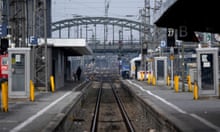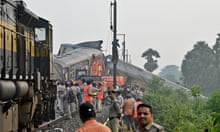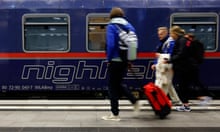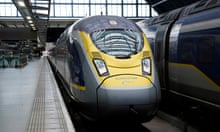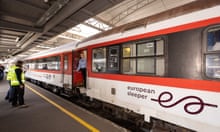If you read European railway timetables from the decades before Britain joined the EU, you notice how much more foreign “the continent” seemed to be. In the 1960s, the Thomas Cook Continental Timetable was prefaced by “Visa requirements”, closely followed by “Fees for obtaining visas”, and relevant extracts from the passport regulations. Only then is the prospective traveller directed to the trains, the lists of which are footnoted with details of exotic operational practices: “At Hendaye, the Paris-Lisbon couchettes are jacked up to change the bogies, on account of the difference in track gauge between France and Spain.”
In those days before budget flights, many of the trains listed (including the one mentioned above) were sleepers: proper long-distance trains, travelling through both days and nights. Our domestic equivalents lacked that sort of drama. The journey on a British sleeper was often over well before the end of the night – particularly so in the case of those that ran from London to Manchester – and the people at the destination spoke the same language (more or less) as those at the starting point.
Depending on the Brexit terms, we might end up regarding Europe as truly foreign once again; and while that would no doubt be diplomatically disastrous, it might make our holidays seem more glamorous. But the transport mode associated with our pre-accession adventures is in decline.
A 2014 Guardian article headlined The Sleeper Vanishes reported the end of services from Paris to Barcelona, Madrid, Rome and Munich. Late last year, Deutsche Bahn announced the cessation of all its sleepers (although some services will be continued by Austrian Railways), and in France SNCF is terminating a dozen night trains.

EU legislation has not assisted the sleepers in their battle with the planes and high-speed trains. Particularly unhelpful was 1995 Railway Directive 95/19, which required train operators to pay “track access charges” to infrastructure providers. The measure shone a harsh spotlight on loss-making services – such as the sleepers – raising the question: “Are they worth paying the charges?” The answer has frequently been: “No.” But we British can’t really blame the EU here, since the directive represents the implementation of the British railway privatisation model, and the transport commissioner who introduced it was Neil Kinnock.
The British always had a mixed attitude to European sleepers. They were storied in many British novels and films, but these tended to be murder stories, usually with a sideline depicting the social embarrassments likely to await the British traveller.
Conductors on the elite sleepers had to be fluent in three languages. The Englishman, fluent in one – and not even that after a few drinks – could easily be intimidated. You might slip this snooty foreigner a banknote to ensure sole occupancy of your compartment, only to have a stranger shown in a few minutes later – as happens to a Mr McQueen in Murder on the Orient Express, the stranger being Hercule Poirot.
The British film of 1948, Sleeping Car to Trieste, satirises – or salutes – British philistinism when confronted with the haute cuisine prepared in the dining cars. The on-board chef (French, of course) engages in a dialogue with an unrefined Englishman who “is thinking of going into the catering racket” and wants a few tips. The chef tells him how to cook a fillet of white fish, involving white wine, shallots, herbs. The Englishman commends the British method – lower it into a pan of hot water and boil it. “But there is no sauce!” exclaims the chef, appalled. “Oh, there’s usually a bottle of sauce lying around somewhere,” says the Englishman.
Over the past 18 months I’ve been riding on the surviving European sleepers. I’ve had my disappointments. I tried to duplicate the journey of the old Orient Express by taking three separate sleepers, but the third one (Bucharest-Istanbul) turned out not to exist. But these tribulations were more than compensated for by experiences such as crossing the Arctic Circle under the strange light of the midnight sun, while riding the Nordland Railway in Norway. The week after Britain’s EU referendum, I broached Brexit with the sleeping car conductor of the Berlin Night Express (Malmö-Berlin). “That’s for the politicians to sort out,” he said. “Losing to Iceland in the Euros – that’s what you should be worrying about.”
The remaining sleepers offer a more immersive experience of Europe than a plane ride ever can. My suspicion is that Brexit will only increase our taste for such things.


